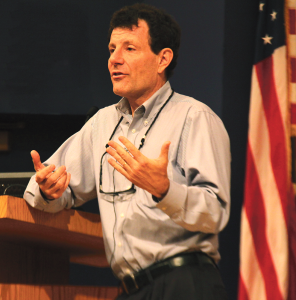
Author and columnist Nicholas Kristof, the recipient of two Pulitzer Prizes, spoke on human rights and global inequalities Sunday.
Pulitzer Prize-winning journalist and author Nicholas Kristof spoke to Georgetown students Sunday about his new book, “A Path Appears,” and his experiences with human rights and political issues plaguing our world today. The event, sponsored by the Lecture Fund, took place in the Intercultural Center Auditorium, drawing an audience of about 100 students.
Kristof began the presentation by showing a brief video promotion of his book, which will be turned into a documentary set to premiere next January. Kristof spoke about issues and stories he has encountered throughout his career as a journalist, ranging from education to human trafficking to equality both abroad and in the United States.
Lecture Fund Vice Chair of External Affairs Helen Brosnan (SFS ’16) introduced Kristof and said that each student who reads his columns and novels experiences a moment of inspiration.
“I have this belief that at some point in everyone’s young adult life they go through what I like to call a ‘Kristof Moment,’” Brosnan said. “To me, a ‘Kristof Moment’ is when you read one of Mr. Kristof’s books or read one of his columns and you single-handedly think you can go change the world in 24 hours.”
When talking about the motivation for writing “A Path Appears,” a follow-up book to his 2009 book, “Half the Sky: Turning Oppression into Opportunity for Women Worldwide,” Kristof said that he and his co-author and wife Sheryl WuDunn wanted to address inequality throughout the world and give readers tools to help make small changes. The name of the novel is based on a proverb by Chinese scholar Lu Xun, according to Kristof.
“He had this wonderful saying that said, ‘Hope is like a path in the countryside. First, there is nothing, and then because people walk this way again and again, a path appears,’” Kristof said.
Kristof said that he and WuDunn wrote the book in response to questions from readers about how they could help make global change with the resources that they have.
“I think that there are a lot of people who would like to engage in the world in some way, but are worried about corruption or inefficiency or whether anyone really can make a difference in the world. I am just a huge believer that one can,” he said.
Kristof spoke of the many different stories and people he has seen throughout his time in journalism, which he said inspired “A Path Appears.”
“Somebody asked me the other day, ‘What is your favorite story?’ And it’s a little like choosing which one of your kids is your favorite” Kristoff said.
Kristof also spoke about his experience with international and domestic issues of inequality. One particular issue that he mentioned was intestinal worms in school children in African countries. According to Kristof, these worms can be eradicated for a cost of 50 cents a year per child.
“We don’t think of that because in this country, kids don’t have intestinal worms,” Kristof said. “In much of the developing world, kids do, and they become anemic, they are less able to concentrate on their work and are more likely to be sick and be absent from school. But, you can deworm a child for 50 cents a year.”
Kristof also spoke about his motivation to follow stories about social inequality, and said that giving is both altruistic and rewarding.
“There are obviously a lot of altruistic reasons people get engaged, but it’s also kind of clear that there are selfish reasons to be altruistic,” Kristof said. “Or that altruism is a tremendous source of selfish pleasures.”
Before opening the floor up to questions, Kristof spoke about what motivated him to help others by taking risks. He told a story about his father, who was imprisoned in a concentration camp in Yugoslavia. After his eventual release, he took refuge at a Catholic church in Portland, Ore.
“I’m very much a beneficiary of people who took a risk. It didn’t solve a global problem … but was transformative for my dad and ultimately for me,” he said.
A question-and-answer session followed Kristof’s remarks. When asked if there was an experience that shaped his career path, Kristof told a story about meeting two young victims of sex trafficking in Cambodia during a trip early in his career.
“I could not believe this was happening,” he said, “It was really hard to then go from talking to these two vibrant, smart young girls who are imprisoned in a brothel to writing about exchange rates. I came back and hugged my family and I could not get that out of my system so I came back again and again. The things I write about are very much a result of my experience as a reporter in the field.”
The event concluded with a book sale and book signing during which students had the chance to meet Kristof.
David Tian (GRD ’16) attended the event because he follows Kristof’s work and was interested in hearing more.
“I came to Nicholas Kristof’s event today because I have been following his column for a long time and he touches on a lot of issues I’m interested in, like human trafficking,” Tian said. “I think his writing really empowers people to believe in themselves, believe they can make a difference in the world and it was really an honor to see him in person.”














